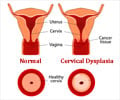An Oxford-led international study has revealed that oral contraceptives increase the risk of developing cervical cancer, but the risk falls once women stop using them. According to the Lancet, the study of 52,000 women showed that the cancer risk increased with the length of time oral contraceptives were used.
However, after a 10-year break from the pill, a woman's risk was the same as if she had never taken it. According to experts, the additional risks were small but they have suggested women to have regular cervical screening. Previous studies have associated the pill with a higher breast-cancer risk but a lower risk of ovarian and womb cancer.The research team looked at more than 52,000 women who had taken part in 24 studies around the world. They found that for those who had taken the pill for at least five years, the cervical cancer risk increased to twice that of women who had never taken it. However, they also found that the risk fell again once women stopped using oral contraceptives and returned to normal by 10 years. It is not the first time research has shown a link between the pill and cervical cancer but it had been unclear how long any risk lasted for.
The researchers said that overall, the additional risk of cervical cancer associated with the pill is small. "The pill remains one of the most effective forms of contraception, and in the long term the small increases in risk for cervical and breast cancers are outweighed by reduced risks for ovarian and womb cancer," the BBC quoted Dr Jane Green, a researcher based at Cancer Research UK's epidemiology unit at the University of Oxford and lead author of the study, as saying.
According to Professor Peter Sasieni, an expert in cancer epidemiology at the Wolfson Institute of Preventive Medicine in London, women should be reassured by the results. "For the individual women regularly going for screening the lifetime risk is more like two in 10,000,” he said.
"One in three women will get cancer in their lifetime anyway so the risk is fairly small. The important thing in this study is it shows what happens when you stop the pill," he added.
Source-ANI
LIN/M











